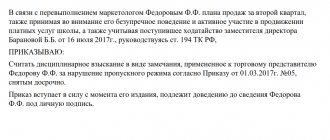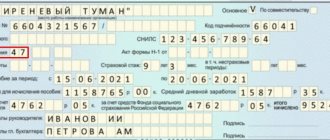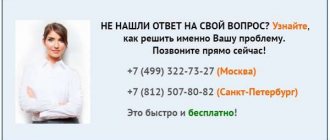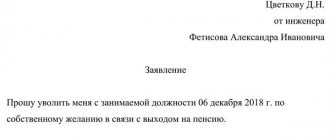Consequences of disciplinary action
The application of disciplinary action in itself is unpleasant. Wasted time writing explanatory notes, negative emotions. If you are subject to liability for violating work discipline, your work may be subject to close attention from colleagues or management. Also, imposing a disciplinary sanction entails several unpleasant moments:
- Material retentions . If this is reflected in the bonus regulations, collective agreement or other acts of the company, the presence of a remark or reprimand allows the employer to reduce the size of the bonus or not pay it at all. The employee may also be deprived of incentive payments or various additional payments.
- Disadvantages for the team . In some cases, companies that use such motivational schemes as teamwork may provide in local regulations that the application of a penalty to one employee - a team member - reduces the level of bonuses for the entire team.
- Dismissal . Dismissal in itself is already a disciplinary measure. The grounds for dismissal are enshrined in Article 81 of the Labor Code of the Russian Federation. But sequential imposition of several disciplinary sanctions can also result in dismissal.
IMPORTANT : if within a year after the application of a disciplinary sanction, the employee did not violate the rules of labor discipline, then the sanction is considered lifted.
What is the validity period
Information on the duration of disciplinary sanctions is specified in Art. 194 Labor Code of the Russian Federation.
In our own words, we can say that if there are no complaints against the employee within a year after the first disciplinary sanction, then it is automatically removed. That is, the personnel employee may not make any notes. This means that the collection period is one year.
When you quit, things are a little different. If a violation of labor discipline resulted in the dismissal of an employee, it means that a record of this appears in his personal file, a corresponding order is issued, and an entry appears in the work book.
Therefore, such a practice has emerged among legal organizations - after dismissal for violation of labor discipline, a former employee can appeal to the labor dispute commission and, if possible, it is possible to change the entry in the labor record.
But on the other hand, after dismissal, all disciplinary obligations to a specific employer cease, which means that such a penalty has no validity period.
Grounds for canceling a disciplinary sanction order
If disciplinary measures are taken by the employer, it is necessary to study the available documents. After all, this type of recovery can be appealed.
Key points to pay attention to when appealing a disciplinary sanction:
- Responsibility for someone else's work . Labor functions for non-fulfillment of which a penalty was applied were not assigned to the employee
- Good reasons . If a violation of labor functions or internal labor rules was not the fault of the employee (for example, being late for work due to an accident involving the employee)
- The employee was not asked for an explanation . Explanations must be in writing. The employee may refuse to provide an explanation. Lack of explanation cannot be grounds for canceling a penalty. If the employee refuses to provide explanations, the employer is obliged to draw up a statement of refusal to provide explanations. The lack of explanations from the employee and the simultaneous absence of an act of refusal to give explanations will be grounds for canceling the imposed penalty.
- One disciplinary sanction may be imposed for one offense
- The deadlines for bringing to disciplinary liability were violated
IMPORTANT : the application of disciplinary sanctions is strictly regulated and limited in time:
- month from the date of discovery of the offense for prosecution
- two days for the employee to give an explanation for the misconduct
- two days after not receiving an explanation from the employee to issue a certificate of refusal of explanation,
- three days to familiarize the employee with the order to impose a penalty,
- If the misconduct is discovered after an audit or inspection, the period for bringing to responsibility is increased to 6 months.
USEFUL : order a complaint against your employer from our lawyer in order to restore your rights as an employee
Dismissal as a disciplinary measure for misconduct
Article 81 of the Labor Code of the Russian Federation provides for the possibility of dismissal as a disciplinary sanction. Also, dismissal is considered as one of the types of methods of disciplinary action for the employer under the provisions of Article 192 of the Labor Code, where termination of an employment contract for violation of discipline is permissible. However, the main restrictions intended for use are still set out precisely in Art. 81 Labor Code of the Russian Federation.
Not every disciplinary violation or misconduct can serve as grounds for dismissal as a disciplinary measure. Directly for a single case of misconduct, termination of an employment contract is provided only in situations considered in paragraph 6 of Part 1 of Art. 81 Labor Code of the Russian Federation.
The grounds for this dismissal for a one-time action can only include gross misconduct. These include the following unlawful actions of an employee, which do not depend on the internal rules or regulations of the enterprise:
- Employee absenteeism. This includes situations where a worker was absent from the workplace without a valid reason and did not perform work duties for four hours of one day or one shift in a row. That is, if an employee appeared at the workplace, even for a short moment, which made his time of absence shorter than the specified period, he cannot be dismissed on this basis. The presence of a valid reason allows the employee to avoid dismissal or subsequently be reinstated at work through a judicial procedure.
- Showing up at work while intoxicated. Dismissal in such a case is legal if it was carried out in full accordance with established procedures. In addition, there are many exceptions that allow an employee to challenge this dismissal. For example, employees cannot be fired for this reason without the proper evidence base, which most often can be a medical examination. But there is also the possibility of their dismissal without a medical certificate if there is evidence of intoxication. However, if intoxication was caused by the work environment - exposure to harmful substances, violation of safety regulations, the employee cannot be fired for it.
- Disclosure of secrets protected by law. If an employee who, by virtue of his work duties, has access to a secret protected by law, for its disclosure he can not only be brought to administrative or criminal liability, but also dismissed from work if there is evidence.
- Theft or theft of material assets at the place of work or during the performance of official duties. If an employee has committed theft - both of the property of employers and colleagues, clients, third parties or the state during work, he may be fired for this offense with certain restrictions. In particular, dismissal can only be made on the basis of a corresponding court decision recognizing the employee as a criminal or delinquent.
- In case of violation of labor protection requirements, which entailed or could entail risks of causing death or serious harm to the health of other persons during the performance of work duties. A specialized commission must establish the fact of such violations.
The employer must fully comply with the dismissal procedure, which is quite comprehensive. In some cases, disciplinary liability in the form of dismissal may be applied to an employee along with administrative or criminal liability. For reasons of any other one-time violations of discipline, an employee cannot be dismissed.
Dismissal in case of violation of discipline by an employee on the above points is not mandatory. This is only the right of the employer, and not his direct responsibility.
Objection to the order of disciplinary action
If an employee believes that the application of disciplinary measures against him was unfair and there are grounds for canceling the imposed penalty, he can appeal the order. In this case, it is necessary to draw up an objection to the order.
The objection is drawn up in free form in accordance with the established practice of business document flow.
- The document being drawn up must include the following:
- Recipient . The authority to which the objection to the order will be sent. This could be either the employer, the labor inspectorate, the labor dispute commission or the prosecutor's office.
- Applicant . You must provide your details - last name, first name, middle name, place of registration, contact phone number and email address
- Fable of the case . For correct perception, you must indicate where you work and in what position
- Number and date of the appealed order
- Grounds for canceling an order . It would be optimal not only to indicate the basis, but also the complete picture that emerged when the offense was committed or when a penalty was applied.
- Requirement . Application for cancellation of order
- Date and signature of the applicant
- Applications . All documents on which you base your demands to cancel the order must be attached to the text of the objections.
Disciplinary action in the form of dismissal for several offenses
In addition to the circumstances that allow you to dismiss an employee for a one-time violation of the discipline established at the enterprise, labor legislation also allows you to terminate employment contracts for other offenses, if they are committed repeatedly or if there are disciplinary sanctions previously applied to the employee.
A disciplinary sanction against an employee is considered to exist within one year from the moment the offense was committed. After this period, the employee is considered to have no disciplinary sanctions and cannot be dismissed on grounds involving repeated violations of discipline. Also, the period of validity of the penalty can be reduced at the initiative of the employer.
Disciplinary violations that allow dismissal if there are other sanctions against the employee include all cases of failure by the employee to fulfill his job duties without good reason. At the same time, the legislation does not relieve the employer from the need to carry out all procedural measures to present a penalty to the employee and appropriately formalize the dismissal.
Rules for dismissing an employee on disciplinary grounds
As mentioned above, the extent to which it will be possible to refute the dismissal and reinstate the employee with claims to the employer depends on how the dismissal procedure is carried out from a procedural point of view. The current rules for dismissing an employee on disciplinary grounds provide for the following procedure:
- Obtaining information about the commission of a disciplinary offense. Such information can be conveyed to the employer in writing or orally by other employees of the enterprise, clients, government officials or third parties. Also, the basis for a subsequent inspection and possible dismissal of an employee may be an entry in the complaint book and other sources of information.
- Drawing up an order on the formation of a service commission. An internal commission to investigate disciplinary offenses is formed in the event of an employee violating labor safety rules, causing material damage to the employer, theft or secrets. In the case of other disciplinary offenses, its preparation is not necessary.
- Collection of evidence. The employee’s violation of discipline, the presence of his guilt in the offense, intent and the cause-and-effect relationship between the violation and the employee’s guilty behavior must be documented. Evidence may include customer complaints, testimony from other employees, technical recording equipment at the enterprise or outside it, and other evidence.
- Requesting an explanatory note from the employee. The employee must be given the right to explain his or her misconduct. Notification of the request for an explanatory note should be provided to the employee against the preparation of a corresponding notification act signed by two witnesses. If the employee is not notified or an act of refusal to provide an explanatory note is not drawn up, the dismissal may be challenged in court.
- Issuance of an order or other instruction regarding disciplinary action. After establishing the fact of a disciplinary sanction, the employer issues its own order to impose a disciplinary sanction on the employee. Information about this is recorded in the entrepreneur’s regulatory documents.
- Depending on the severity of the disciplinary offense, the number of violations of discipline and its own desire, the employer may, on the basis of a disciplinary order, issue an order to dismiss the employee. The employee is familiarized with such an order by signing and drawing up an act, and dismissal is carried out on the day the penalty is applied.
- After dismissal, even for a disciplinary offense, the employer is obliged to pay all previously unpaid wages of the employee. In addition, the employee must be given compensation for previously unused vacation days. Payments are made on the day of dismissal.
- The employer issues the employee a work book with a record of dismissal under Article 81 of the Labor Code of the Russian Federation indicating the paragraph and subparagraphs on disciplinary action.
Depending on the specific type of recovery, it can be formalized in different ways and have its own procedural features. Above, the basic algorithm of actions was outlined that can be followed by the employer, accounting department and HR employees.







